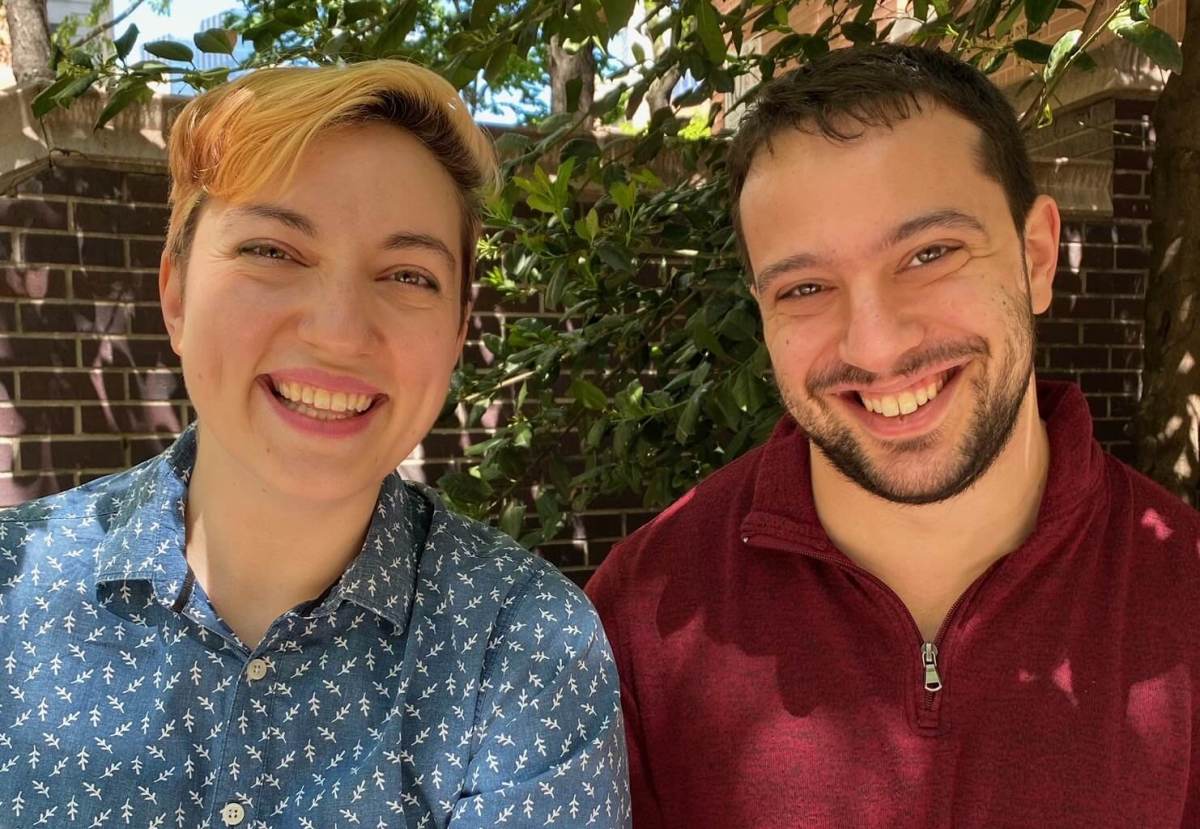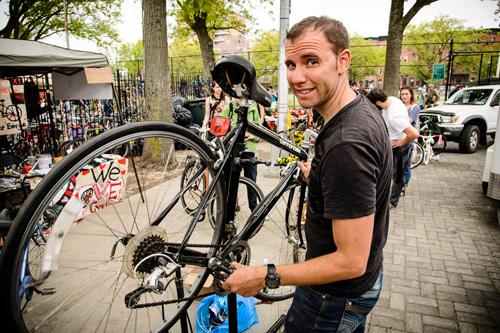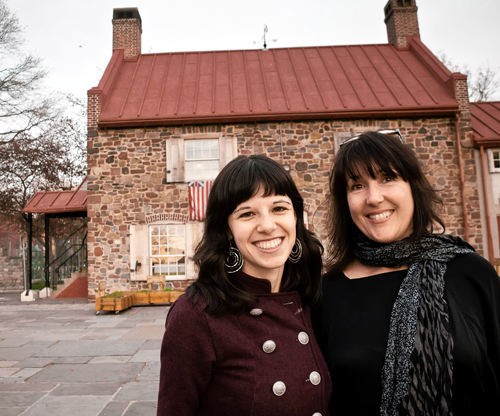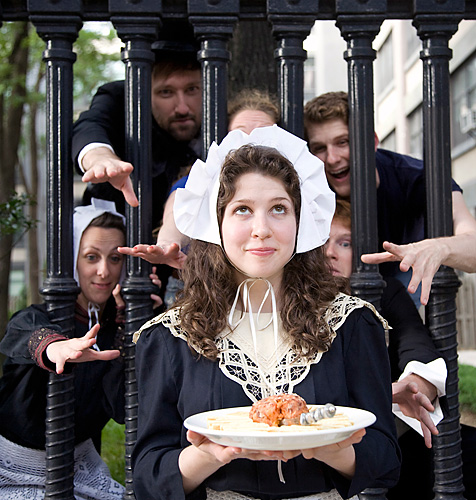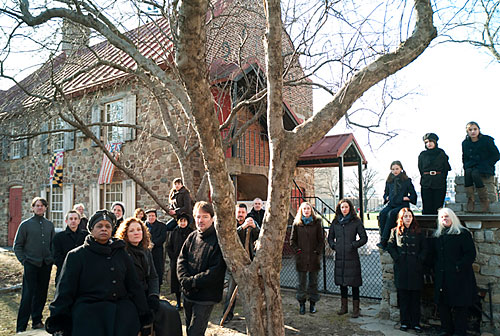A series of outdoor musicals at Park Slope’s Old Stone House will showcase the lesser-known history of the neighborhood as a lesbian sanctuary once affectionately coined “Dyke Slope.”
“Prospect Hill,” a musical written by Mark Galinovsky and Lily Ali-Oshatz and produced by Piper Theater Productions, focuses on a character named Dee in the present day as she acquaints herself with Park Slope after breaking up with her longtime girlfriend and moving to the neighborhood from Manhattan.
Dee moved in with her brother and reconnects with her hometown friends, who take her under their wing, but her most impactful relationship is with her landlord, Jonie — a remnant of old New York whose ownership of the building allowed her to stay in the neighborhood as real estate shot sky-high in the early 2000s.
“Dee is deep into her breakup and she meets her landlord named Jonie,” Ali-Oshatz told Brooklyn Paper. “She has lived in the neighborhood for 20-plus years, and she has this role as being the landlord in her apartment and that is one of the reasons that she was able to afford to stay in the neighborhood as it was gentrifying at a fast pace”
Jonie lived her heyday in Park Slope and told Dee of all the wondrous stories of the lesbian haven, and the younger friend gets very wrapped up in that history.
“[We] have a relationship of one character who vividly remembers when Park Slope had more of a community, more of a feeling of place for queer women,” said John McEneny, the co-founder and artistic director of Piper Theater Productions. “And then having her have a younger girlfriend who is more about diversity in different ways and not needing special places to have people of one kind.”
But along the way, Dee sees that instead of reaching for the past, the lesbian community needs to celebrate what these spaces would look like in the modern-day, and how they are so different.
“I think it’s a bigger conversation about how often we think we need to be reaching back into something that’s lost, when actually it’s not lost, it actually created the evolution that was needed,” Jessi Hill, the musical’s director told Brooklyn Paper.
The musical’s story is especially relevant today as city dwellers work to support and preserve the city’s few remaining lesbian bars, like the beloved Cubbyhole in Manhattan and the Slope’s own Ginger’s Bar.
While the main storyline is set in the present day, the musical travels through time to the days of “queer slope” as well as to notable moments in the neighborhood’s history.
“There is a lot of time-era jumping in the show,” said Ali-Oshatz. “We have these vignettes of important Park Slope history moments that are outside of the 80s and 90s … and there is also a time that shows Jonie in her youth in the mid-90s with her best friend May and what it was like for them as queer women in the 90s to exist in Park Slope when it was a lesbian neighborhood.”
Jonie’s narrative is inspired by the interviews of more than a dozen lesbian women who lived in the enclave during its prime in the 80s and 90s — after which, the writers say, gentrification pushed young single women out of the neighborhood.
“One of the first things I did was start to interview actual lesbians who had been in the neighborhood in the 80s and 90s when the neighborhood was Dyke Slope,” Ali-Oshatz told Brooklyn Paper. “We wanted as much clarity and as many different perspectives as possible.”
Many are unaware of Park Slope’s past, said the musical’s creators, who only recently were able to uncover so much about their nabe, and said they want to share that history from the perspectives of those who have been so often left out.
“I really had no access to knowledge about the history of my own stomping grounds,” Ali-Oshatz said. “It was pretty emotional to be uncovering these things for ourselves and to really realize as queer New Yorkers, as queer Americans, and queer humans in this world we don’t always have access to mentorship for our queer elders.”
The musical’s creators told Brooklyn Paper they are excited to explore Park Slope’s history with the backdrop of the neighborhood’s iconic Old Stone House – the reconstruction of a 1699 Vechte-Cortelyou house on land taken from the Lenape Native American tribe 50 years earlier and where the 1776 Battle of Brooklyn ended.
“To see the story in front of this old stone house which is a reenactment of a farmhouse from Brooklyn,” said McEneny. “It’s just a really beautiful thing.”
They hope the audience goes home with a renewed sense of investment in their communities and ready to put in the hard work it takes to make a neighborhood thrive.
“My hope is that people leave Prospect Hill feeling activated and excited about being invested in their communities and that they feel empowered to take that on themselves,” Ali-Oshatz said. “Because our community is only going to be as strong and healthy as we make it.”
A cast of emerging actors and artists bring the show to life, many of whom were never given the chance to play a role they can see themselves in, said the playwrights, who worked hard to make sure the LGBTQ+ roles were accurately represented.
“I can tell you across the board, the visibility that it is giving so many people in the sense of being able to play a queer character,” Hill said, “like some of them are openly out, queer, proud people who have never had the opportunity to play a queer person in a musical.”
Piper Theater Productions commissioned the musical as part of their new program “Musicals Now” two years ago, expecting to showcase it in the summer of 2020. Instead, the group was given an extra year to refine and improve the production due to the pandemic.
“They changed everything. They got a new director, they even wrote new music, they interviewed tons of senior women who lived in Park Slope during the 80s and 90s, they did more research,” McEneny said. “They worked so hard on it every step of the turn.”
The production is the first of a decade-long series sponsored by the city’s Department of Cultural Affairs in which the theater company will take submissions to produce Brooklyn-based musicals.
“This is part of a new program that we are committed to for the next ten years called ‘Musical Now’ where we are going to produce a new musical every single summer,” McEneny said, “and present to the free, give it full support and then have it premiere at the Old Stone House.”
“Prospect Hill” will be shown at Park Slope’s Old Stone House (336 Third St. between Fourth and Fifth Avenues) on July 15–17, 22–24 at 8:30 pm. Free with donations encouraged.
Performances on July 16 and 24 will include ASL interpretation.


